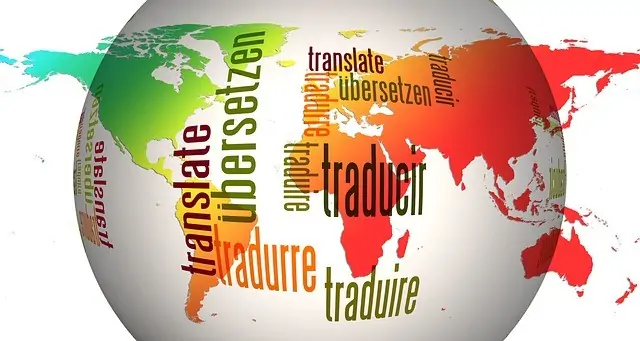In today’s interconnected world, where businesses and individuals communicate across borders, online translations have become an integral part of global communication. Whether you’re a business owner, a traveler, or someone seeking to connect with people from different cultures, understanding the nuances of online translations is crucial. This article aims to provide you with a comprehensive overview of online translations, their types, benefits, challenges, and tips for effective usage.
Introduction to Online Translations
Online translations refer to the process of converting text from one language to another using digital tools and services. These translations can be performed by both machines and humans, each offering its own advantages and limitations. The advancements in technology and artificial intelligence have revolutionized the field of translation, making it more accessible and efficient than ever before.
The Importance of Online Translations
Breaking down language barriers
Language barriers can hinder communication and limit opportunities for businesses and individuals alike. Online translations bridge these gaps by enabling seamless communication across different languages. They empower businesses to expand their reach to international markets and allow individuals to connect with people from diverse backgrounds.
Expanding global reach
In the age of the internet, reaching a global audience has become essential for businesses to thrive. Online translations play a crucial role in helping businesses localize their content and reach customers in different parts of the world. By speaking the language of their target audience, businesses can effectively convey their message and build strong connections.
Facilitating international communication
Whether it’s international conferences, collaborations, or personal interactions, effective communication is vital. Online translations facilitate smooth communication by enabling individuals and organizations to overcome language barriers. This fosters cultural understanding, strengthens relationships, and promotes global cooperation.
Types of Online Translation Services
There are primarily three types of online translation services: machine translation, human translation, and hybrid translation.
Machine translation
Machine translation relies on algorithms and artificial intelligence to automatically translate text from one language to another. Popular machine translation tools include Google Translate and Microsoft Translator. While machine translation offers speed and convenience, its accuracy and ability to capture context may be limited.
Human translation
Human translation involves professional translators who are fluent in both the source and target languages. They possess the linguistic and cultural knowledge necessary to ensure accurate and contextually appropriate translations. Human translation provides a higher level of quality and is particularly valuable for complex or specialized content.
Hybrid translation
Hybrid translation combines the strengths of both machine and human translation. It utilizes machine translation as a starting point and then involves human translators for reviewing, editing, and fine-tuning the translations. This approach aims to achieve the best balance between efficiency and accuracy.
Pros and Cons of Machine Translation
Machine translation offers several advantages but also has its limitations.
Advantages
- Speed: Machine translation can produce translations quickly, allowing for instant comprehension of basic information.
- Cost-effective: Machine translation is often more affordable than human translation, making it a suitable option for large volumes of content.
- Accessibility: Online machine translation tools are readily available and can be accessed from anywhere with an internet connection.
Limitations
- Accuracy: Machine translation can produce inaccurate translations, especially when it comes to complex sentence structures, idiomatic expressions, and cultural nuances.
- Context: Machine translation may struggle to capture the intended meaning and context behind the text, resulting in potentially misleading or confusing translations.
- Quality inconsistency: The quality of machine translation can vary depending on the language pair, domain, and complexity of the text.
Advantages of Human Translation
Human translation offers distinct advantages that ensure high-quality and culturally appropriate translations.
Accuracy and context
Professional human translators have a deep understanding of both the source and target languages. They can accurately translate text while capturing the context, nuances, and cultural sensitivities specific to each language.
Cultural sensitivity
Language is closely intertwined with culture. Human translators possess cultural knowledge and sensitivity, allowing them to adapt the content to the target audience’s cultural norms, idioms, and preferences.
Nuanced understanding
Human translators excel at understanding and conveying the subtle nuances and complexities of a language. They can accurately interpret idiomatic expressions, wordplay, and figurative language, ensuring the translated content resonates with the target audience.
The Rise of Hybrid Translation
As the demand for efficient and accurate translations grows, hybrid translation has gained popularity.
Combining the best of machine and human translation
Hybrid translation leverages the speed and convenience of machine translation while harnessing the linguistic expertise and cultural understanding of human translators. It begins with machine translation as a starting point and then involves human translators for post-editing and refinement.
Enhanced efficiency and accuracy
By utilizing machine translation as a preliminary step, hybrid translation reduces the workload for human translators and increases efficiency. Human involvement ensures the final translation is accurate, culturally appropriate, and refined.
Considerations for Choosing an Online Translation Service
When selecting an online translation service, several factors should be considered to ensure the best possible results.
Quality and accuracy
Choose a translation service that guarantees high-quality translations and employs professional human translators with expertise in the desired language pair and subject matter.
Speed and turnaround time
Consider the speed at which the translation service can deliver the translations. Balancing speed and accuracy is crucial, especially when working with tight deadlines.
Cost-effectiveness
Evaluate the pricing structure of the translation service and ensure it aligns with your budget and translation needs. Consider the cost per word, additional fees, and any volume discounts available.
Confidentiality and security
Ensure the translation service has robust security measures in place to protect the confidentiality of your sensitive information and documents. Look for a service that offers non-disclosure agreements if necessary.
Tips for Effective Online Translations
To make the most out of online translations, consider the following tips:
Provide clear instructions
When submitting content for translation, provide clear instructions regarding the target audience, tone, style, and any specific terminology or guidelines. Clear instructions help translators produce more accurate and contextually appropriate translations.
Utilize glossaries and style guides
If you have a specific brand voice or industry-specific terminology, provide translators with glossaries and style guides. These resources ensure consistency and accuracy throughout the translations.
Communication and feedback
Maintain open communication with the translators or translation service provider. Address any questions or concerns they may have, provide feedback on the translations, and foster a collaborative relationship to achieve the desired outcomes.
Proofreading and editing
Always allocate time for proofreading and editing of the translated content. This step ensures the accuracy, clarity, and overall quality of the translations before they are published or shared.
Online Translation Tools and Platforms
Several online translation tools and platforms are available to facilitate the translation process. Here are a few notable ones:
Google Translate
Google Translate is a widely-used machine translation tool that offers translations for numerous languages. While it is convenient for quick translations, it may not always provide the accuracy and context required for professional use.
Translation management systems
Translation management systems are platforms that streamline the translation process by managing translation projects, assigning tasks to translators, and facilitating collaboration. They can be particularly useful for businesses with ongoing translation needs.
Professional translation services
Professional translation services, such as agencies or freelance translators, offer expert human translation services. These services ensure high-quality translations tailored to your specific needs, providing a human touch that can accurately convey your message.
Challenges and Limitations of Online Translations
Despite the advancements in online translations, certain challenges and limitations persist.
Idiomatic expressions and cultural nuances
Idiomatic expressions and cultural nuances can be challenging to translate accurately. Machine translation may struggle to capture these nuances, requiring human translators’ expertise to ensure proper interpretation.
Legal and technical translations
Legal and technical translations often require specialized knowledge and precision. Human translators with expertise in these fields are essential to ensure accuracy and compliance with industry-specific terminology.
Localization and adaptation
Translating content involves more than mere word-for-word conversion. Localization and adaptation are necessary to ensure the translated content aligns with the cultural and linguistic norms of the target audience.
The Future of Online Translations
The field of online translations continues to evolve, driven by advancements in technology and artificial intelligence.
Advancements in artificial intelligence
Artificial intelligence, particularly neural machine translation, has significantly improved the quality and accuracy of machine translation. As AI continues to advance, machine translation tools are expected to become even more sophisticated and reliable.
Neural machine translation
Neural machine translation utilizes neural networks to analyze and translate text, resulting in more natural-sounding translations. This technology is continually improving and holds promise for achieving higher translation quality in the future.
Continuous improvement and innovation
Translation technology will continue to improve, with ongoing advancements in machine learning, natural language processing, and data analysis. Continuous innovation will enable more efficient, accurate, and contextually appropriate translations.
Conclusion
In conclusion, online translations have become an essential tool for global communication and bridging language barriers. Whether utilizing machine translation, human translation, or a hybrid approach, the key lies in choosing the right translation service based on your needs and goals. With clear instructions, effective communication, and the utilization of online translation tools and platforms, businesses and individuals can overcome language barriers and connect with a global audience. As technology advances, online translations will continue to evolve, offering more accurate and efficient solutions for breaking down language barriers and fostering cross-cultural understanding.
FAQs About Online Translations
Machine translation can provide a general understanding of a text, but its accuracy can vary depending on the complexity of the content and the language pair. It may struggle with idiomatic expressions, cultural nuances, and context.
Human translation offers accuracy, cultural sensitivity, and a nuanced understanding of the source and target languages. It ensures contextually appropriate translations and is particularly valuable for complex or specialized content.
Reputable online translation services prioritize confidentiality and security. They have measures in place to protect your sensitive information and may offer non-disclosure agreements if necessary.
Clear instructions, the use of glossaries and style guides, effective communication and feedback, and thorough proofreading and editing are crucial for ensuring the quality of translations.
The future of online translations is promising, with advancements in artificial intelligence and neural machine translation. Continuous improvement and innovation will lead to more accurate and contextually appropriate translations.






